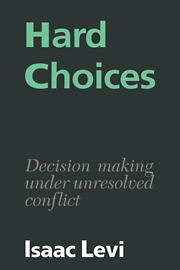Book contents
- Frontmatter
- Contents
- Preface
- 1 MORAL STRUGGLE
- 2 DILEMMAS
- 3 VALUES IN SCIENTIFIC INQUIRY
- 4 CHOICE AND FOREKNOWLEDGE
- 5 VALUE STRUCTURES
- 6 VALUES REVEALED BY CHOICES
- 7 UNCERTAINTY AS A SOURCE OF CONFLICT
- 8 CONFLICT AND SOCIAL AGENCY
- 9 DISTRIBUTING BENEFITS
- 10 UTILITARIANISM AND CONFLICT
- 11 SOCIAL CHOICE THEORY
- 12 CONFLICT AND INQUIRY
- Notes
- Bibiliography
- Name index
- Subject index
- Frontmatter
- Contents
- Preface
- 1 MORAL STRUGGLE
- 2 DILEMMAS
- 3 VALUES IN SCIENTIFIC INQUIRY
- 4 CHOICE AND FOREKNOWLEDGE
- 5 VALUE STRUCTURES
- 6 VALUES REVEALED BY CHOICES
- 7 UNCERTAINTY AS A SOURCE OF CONFLICT
- 8 CONFLICT AND SOCIAL AGENCY
- 9 DISTRIBUTING BENEFITS
- 10 UTILITARIANISM AND CONFLICT
- 11 SOCIAL CHOICE THEORY
- 12 CONFLICT AND INQUIRY
- Notes
- Bibiliography
- Name index
- Subject index
Summary
Dewey once wrote:
Diversity does not of itself imply conflict, but it implies the possibility of conflict, and this possibility is realized in fact. (Dewey, 1983: 38)
According to Dewey, conflict in “habits” (which correspond roughly to what I have called “value commitments”) provokes inquiries aimed at the revision of such habits to eliminate the conflict. In Dewey's view, therefore, the conditions provoking inquiry concerned with modifying values are themselves generated by the diversity of habits or value commitments endorsed by agents or members of a community. Circumstances arise, often unexpectedly, in which value commitments which heretofore have cohered well in practical applications are no longer jointly applicable. That conflict-generating situations develop is not a logical consequence of value pluralism, but it is, as Dewey says, a fact.
Coming to terms with this fact intelligently does not deny value pluralism by substituting some single standard of “intrinsic” value for it. Efforts to do so are fruitless, so Dewey would argue, and are tied to an untenable quest for certainty:
Love of certainty is a demand for guarantees in advance of action. Ignoring the fact that truth can be bought only by the adventure of experiment, dogmatism turns truth into an insurance company. Fixed ends upon one side and fixed “principles” – that is authoritative rules – on the other, are props for a feeling of safety, the refuge of the timid and the means by which the bold prey upon the timid. (Dewey, 1983: 167)
- Type
- Chapter
- Information
- Hard ChoicesDecision Making under Unresolved Conflict, pp. 219 - 222Publisher: Cambridge University PressPrint publication year: 1986



